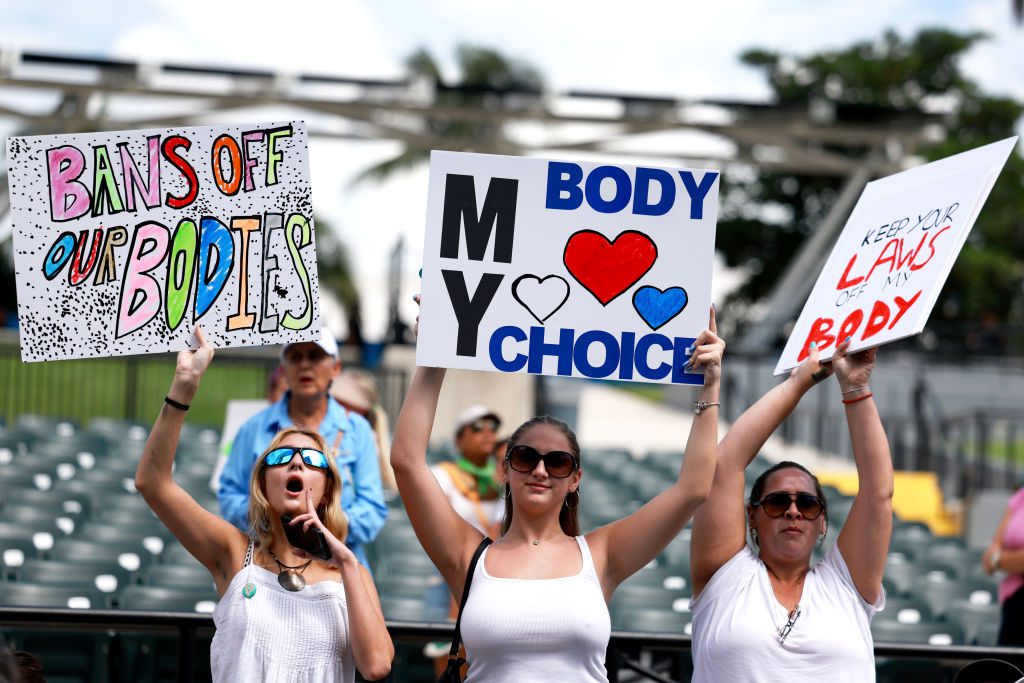
People attend the Our Bodies Our Lives: A Rally for Reproductive Freedom in Miami, Florida. Photo by Joe Raedle/Getty Images
The state’s 6-week abortion ban that went into effect in May endangers women with at-risk pregnancies and puts medical practitioners in an ‘extremely’ difficult position, a Florida doctor says.
Dr. Cecilia Grande, an Obstetrics & Gynecology specialist in Miami, is a strong opponent of the six-week abortion ban that took effect May 1st in Florida.
Signed into law by Republican Gov. Ron DeSantis, the ban prohibits abortions after six weeks of pregnancy, which is before most women know they are pregnant. And though the law comes with exceptions for fatal fetal abnormalities and to protect the life of the mother, as well as for victims of rape, incest, and human trafficking, these exceptions, says Dr. Grande, are vague or misleading, and can cause serious complications for both patients and their doctors.
Dr. Grande sat down with Floricua to discuss the potential ramifications of the ban that she calls “a human tragedy,” and to express her support for Amendment 4, a citizen ballot initiative that would enshrine abortion rights in the state Constitution. It would protect abortion rights up to viability, which is generally understood to mean when a baby can survive outside the womb, which the medical community puts at about 24 weeks.
Why is it that many women don’t know they are pregnant at six weeks?
Dating pregnancies is very tricky, because a lot of people have irregular periods. The majority of patients that you see with wanted pregnancies, you see them after six weeks. When you look at the numbers of the Centers for Disease Control (CDC), most terminations of pregnancies in the United States are done before 10 weeks. A six-week ban in reality is like a total ban in Florida. It’s going to affect patients that are underserved, patients that may have other conditions.
RELATED: Florida’s biggest anti-abortion politicians are seeking reelection in November
How does the six-week ban specifically affect patient care?
The legislature uses wording that is very confusing. They say, well, if the patient’s life is at risk, you can go ahead and induce the delivery. But what is ‘at risk’? Do we wait for them to be very sick, or just slightly sick? We’re seeing patients that are more than six weeks [pregnant] being sent away with rupture of membranes, with their water broken… One of the pillars of public health is bodily autonomy. It’s when you present to the patient what’s going on and what the options are, and the patient decides what they want to do. So, basically, putting a six-week ban is completely eliminating the bodily autonomy of the patient. It’s a major infraction of medical ethics.
Florida was one of 10 states that didn’t expand Medicaid. How does this play out with the six-week ban?
We have the added problem that the state Legislature did not pass the extension of Medicaid that was proposed by the Federal government two years ago. I had frantic phone calls from patients that were given letters that their insurance was going to run out. So, we have a state that restricts Medicaid, but is now making patients carry a pregnancy, and is also making it hard for physicians to make a call of how late, or how early, we can intervene when a patient’s having complications without the fear of being prosecuted. The penalties for aiding [in an abortion after six weeks] can be up to five years in prison and losing your license. So, it becomes extremely, extremely, difficult for the patient and for the doctor.
RELATED: Fact-checking Trump’s lies on abortion during the presidential debate
There are some exceptions to the six-week ban, such as for rape and incest. Are those effective, in your opinion?
My understanding is that there are three major exceptions for incest, rape, sex trafficking. Then the exception goes up to 15 weeks. But for that to occur, that victim has to go through a court system and get an order. A lot of people that know more than I do about trauma will tell you that one of the first mechanisms of these victims is denial. So sometimes by the time they realize they’re pregnant, or they want to address the situation, they’re going to be past 15 weeks. Also, it takes money and courage to go to court and get an order from a judge, especially in cases of incest.
The second exception is – theoretically – for fetal abnormalities that are lethal. The problem is that there are many anomalies that are detected in the fetus that have a certain likelihood of lethality. So, if the likelihood of the fetus dying is, let’s say, 85% or 90%, there’s still that little percentage that it won’t happen. So then that’s the dilemma. Is somebody going to sue that physician because the question of mortality is not 100% guaranteed?
Then the third exception is for maternal health. Again, a gray area, because as I said before, how sick does somebody have to get for us to intervene?
What are some of the ways the ban affects doctors?
So, a six-week ban puts a lot of strain on the emergency room and on the doctors and on the patients, because we’re seeing patients that are more than six weeks being sent away with rupture of membranes, with their water broken. The doctor and the patient are in a very hard spot.
An example is a hospital in Hollywood [Florida] that turned a patient away that was 15 weeks [along] with rupture of membranes. So, the patient got really sick. She complained to the Centers for Medicare & Medicaid Services, and they sent her to the hospital, threatening them to cut federal funding. So that’s the thing. The thing is no matter what the doctor does, no matter if we act like we were taught, we’re told to do malpractice, we’re told to send the patient home and wait for the patient to be sick. So then if the patient gets sick, we get sued. It’s a very, very difficult situation and the best way I can put it is a human tragedy.
What do you think about Amendment 4, the grassroots initiative to enshrine abortion on the state Constitution. What do you say to women about the upcoming Nov. 5 election?
I support Amendment 4, and I urge all my patients to get involved in the conversation; to have a say in their reproductive rights and in their daughters’ future. I don’t tell them how to vote. But I tell them ‘Get registered and vote’. We can’t lose our civil liberties. My daughter now has fewer rights than my mother had in her day. That is unheard of.
Support Our Cause
Thank you for taking the time to read our work. Before you go, we hope you'll consider supporting our values-driven journalism, which has always strived to make clear what's really at stake for Floridians and our future.
Since day one, our goal here at Floricua has always been to empower people across the state with fact-based news and information. We believe that when people are armed with knowledge about what's happening in their local, state, and federal governments—including who is working on their behalf and who is actively trying to block efforts aimed at improving the daily lives of Florida families—they will be inspired to become civically engaged.


Opinion: Comstock is Trump and the GOP’s backdoor to a national abortion ban
In an op-ed, Kate Kelly highlights how the 1873 Comstock Act, passed at the behest of Anthony Comstock — a man so obsessed with abortion providers,...

‘It’s really important that we have federal protections across the board,’ pro-choice advocate says
As the fight to enshrine abortion rights in the Sunshine State's Constitution continues, a national group works to secure reproductive rights on the...

Hurricane fallout: Florida housing sales drop, insurance rates rise
In Fort Lauderdale, pending sales dropped 15.2% year over year during the four weeks ending Nov. 10—the biggest decline among the 50 most populous...

Need a laugh? Follow these 6 hilarious Puerto Rican influencers.
If there's been too much doom and gloom in your social feeds, make sure to follow these Puerto Rican comedy influencers. You'll thank us later....




